'I was told Mr Loverman was too niche for TV'
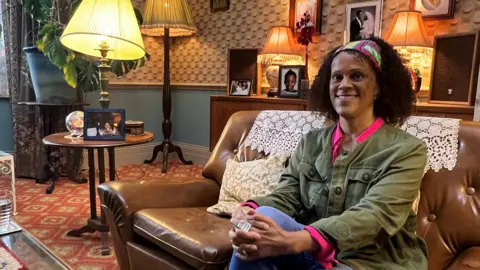 BBC
BBCBernardine Evaristo's ground-breaking novel Mr Loverman was released in 2013, telling the story of a married 74-year-old Antiguan-born Londoner who has been having a secret love affair with his best friend for the past 60 years.
More than a decade on, the lives of Barrington Jedidiah Walker, his wife Carmel and his lover Morris De La Roux are being brought to the screen for a new eight-part BBC drama starring Line of Duty's Lennie James.
"I love it. Everything in here is absolutely perfect," says Evaristo as she sits back on the brown leather sofa.
The Booker Prize-winner is on a visit to the set in a Neasden studio where the Walkers' Stoke Newington home has been recreated.
The living room she sits in is filled with knick-knacks and family photos, amid a garish clash of of geometric beige wallpaper, turquoise walls and a patterned red carpet.
"It's such a wonderful experience seeing a book that I wrote come to life visually."
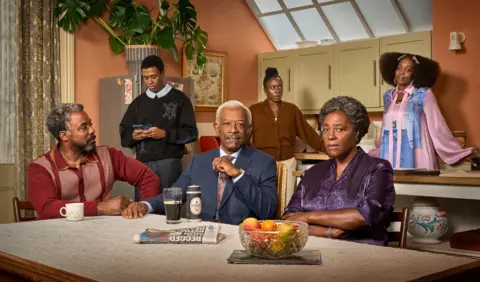 BBC/Fable Pictures/Des Willie
BBC/Fable Pictures/Des WillieFinding herself inside a world she originally created on paper appears to suit a person who says her favourite thing about writing is being able to "inhabit" her characters.
"When I was writing Mr Loverman, I was Barrington and my husband would come home and I would say [putting on Barrington's voice]: ‘Oh hello darling, you want something to eat?’
"He'd be like, 'Why are you talking like that? Are you OK?’" she laughs.
Protagonist Barrington - or Barry - is a husband, father and grandfather who moved with his highly religious wife Carmel from Antigua to Hackney in east London in the 1960s.
He has been living there ever since but throughout that time has been continuing a secret affair he started with Morris back in the Caribbean.
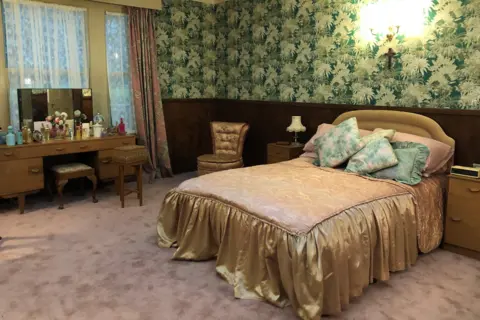
Evaristo, 64, says she chose the subject because while "everybody knows about the Windrush generation now... we don't really hear stories about that generation being gay".
The writer says she wasn't daunted to take on such a story, being a woman born in London and of Nigerian descent, because "I'm not a complete stranger to that world".
"As a writer, I'm absorbing people all the time," she explains.
"I'm very curious, even nosy... I've been around enough Caribbean people of an older generation to feel comfortable to write those kinds of characters."

Hackney, where the book is based, is also somewhere Evaristo knows very well.
Having grown up in London, she has featured different parts of the city in many of her stories, including Hello Mum, The Emperor’s Babe, and Girl, Woman, Other - for which she jointly won the Booker Prize in 2019.
"I have known Hackney since 1979 and I've had family living there, friends living there, I've worked there.
"So I have seen it transition from an area that was quite poor, quite working class... to an area that's now very expensive and is a bit of a hipster heaven," she says.
As such, Evaristo says she wanted Mr Loverman "to capture the Hackney that I remember when you would see these old Caribbean people hanging out, walking down the street - some of these old Caribbean men were very flamboyant dressers".
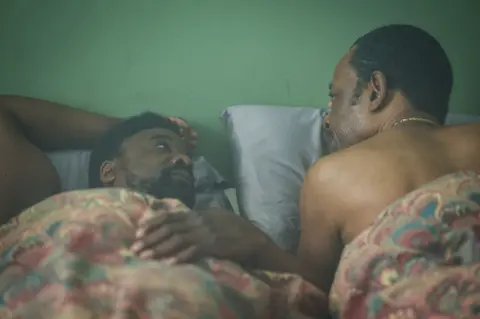 BBC/Fable Pictures/Des Willie
BBC/Fable Pictures/Des WillieHackney has continued to change in the 11 years since the book was published, but the novelist believes little would be different about Barrington, Carmel and Morris if she had written the novel now, given they live "in a bubble".
"Hackney's changing around them but their worlds, their network, their social circle, where they live, hasn't changed that much so I don't think that 2024 will really see a different world to the one they're living in at the moment.
"I don't think Barrington will have a mobile phone," she adds, before noting with some surprise there is a computer sitting in the living room.
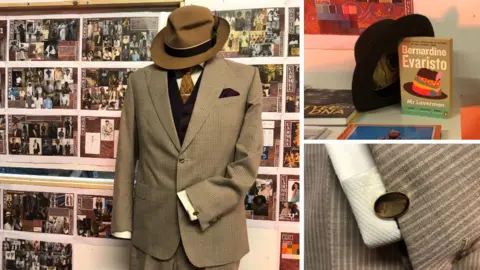
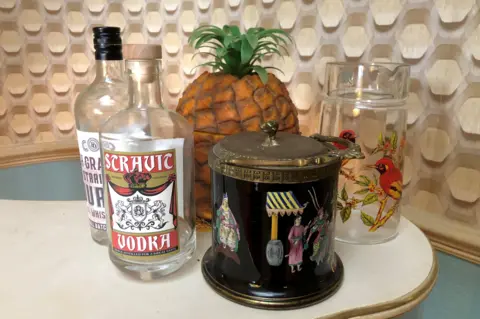
Evaristo says that when the book was published, there were questions about whether it could ever be adapted for TV.
"I believed that the work would transfer to the screen - that wasn't an issue for me. It was maybe an issue for other people who didn't think, perhaps, that there'd be a market for it.
"Somebody said to me it was 'triple niche', because he was black, old and gay," she continues.
"They wouldn't say that now... but times have changed. We are so much more inclusive, so much more progressive, and long may it last."
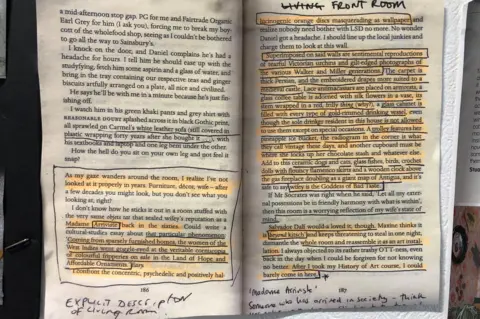
Feeling so close to the characters she created, the author considers it "an adventure" to see how they have been developed for the first adaption of her work for the screen.
As for what she's hoping will be the reaction to the series, Evaristo says she wants people to "love it, clearly", but also "to feel that they've never seen anything like it before".
"I want people to feel that they have somehow been enlightened about people living lives that they may not be familiar with."
All episodes of Mr Loverman are available on BBC iPlayer.
Listen to the best of BBC Radio London on Sounds and follow BBC London on Facebook, X and Instagram. Send your story ideas to hello.bbclondon@bbc.co.uk
